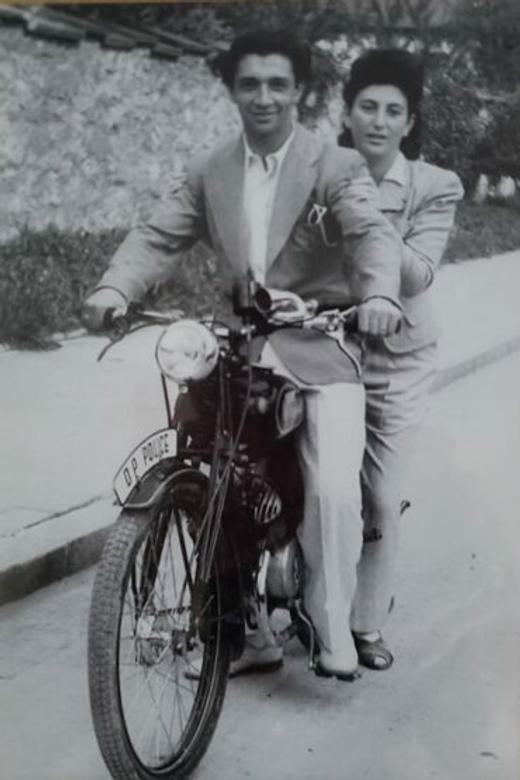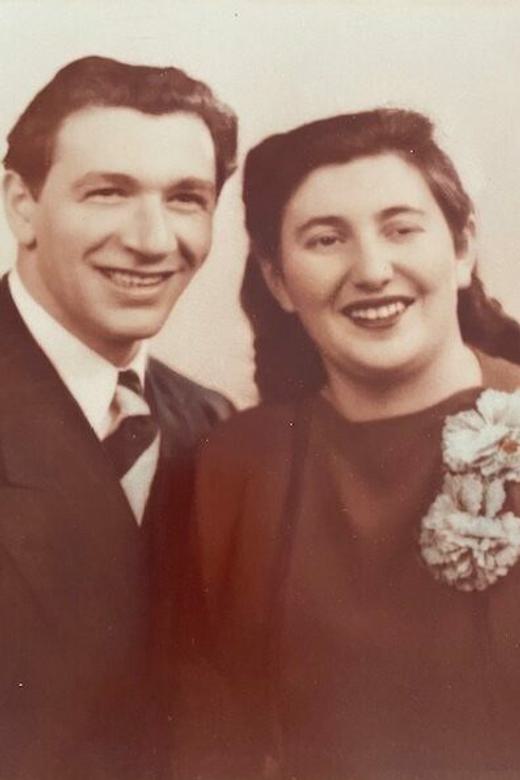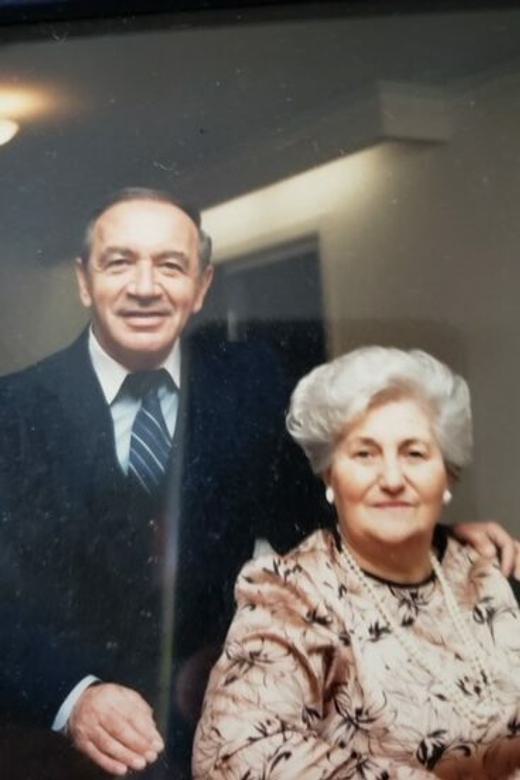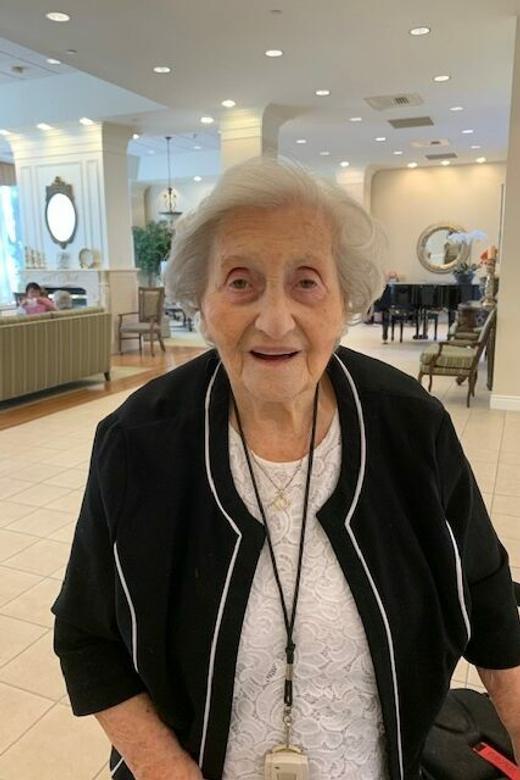Rose Mandelbaum
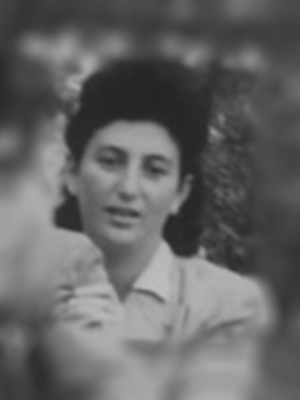
Born: Kovno (Kaunas), Lithuania, 1926
Wartime experience: Ghetto, camp, escape
Writing Partner: Marcie Somers
Rose Mandelbaum was born in Kovno (Kaunas), Lithuania, in 1926. Her father died before World War II began. After Germany invaded Lithuania in 1941, Rose, her mother and her two sisters were forced into the Kovno ghetto.
Rose, her mother and her older sister were forced to work. Her younger sister, Sara, was taken in a selection and killed. In July 1944, the ghetto was liquidated, and the three women were sent by train to the Stutthof concentration camp and then to a forced labour camp. During a death march, they escaped to a village and eventually, after liberation, ended up in Białystok. There, Rose met Harry, an officer in the Polish army. Rose and Harry married in Poland in 1945 and lived outside the displaced persons (DP) camp in Landsberg am Lech, Germany, before coming to Canada in 1947. Rose and Harry lived in Toronto, where they opened a grocery store and raised a family. Rose Mandelbaum passed away in 2025.
Kovno Invaded
I was born October 29, 1926, in Kovno (Kaunas), Lithuania. I grew up on a street called Vaisių with my mother, Riva, my father, Israel, my older sister, Tiba, and my younger sister, Sara.
I have very few memories from before the war. It felt like such a short life and it went by so fast, but I remember life being very hard. We were very poor, so, for instance, when it was Passover we had to take our dishes to the lake to make them kosher because we didn’t have two sets of dishes.
I was very close to my father; he was a learned man and a former yeshiva student, but with three daughters and a wife, he had to work to make a living and support our family. He sold cosmetics to barber shops, and every day he would schlep large containers of cosmetics around with him. Most days after school, I helped my father carry the containers because they were so heavy. Many times, the owners would try to push back their payment and tell my father that they would pay him the following week. I always stuck up for my father and told them, “No, he has a family to look after. You will pay him now.”
My father passed away before the war. He was young — he was only thirty-eight — and he died suddenly. He had what turned out to be an angina attack in the courtyard of the home we were living in. I remember it was the month of November and quite chilly out. When we got home, we found my father unconscious and rushed him to the hospital, but it was too late.
***
In June 1940, the Soviets invaded Kovno and closed all the Hebrew day schools but left one Jewish Gymnasium open, which I went to for one year. Going to school for that one year was a lifesaver. At the time, my mother was working at the factory that made cosmetics.
The following summer, in June 1941, the Soviets sent many of the children in Kovno to a Communist summer camp in Palanga, a Lithuanian town on the coast of the Baltic Sea. I was only there a couple of weeks when we saw German soldiers approaching. They arrested as many Jews as they could find, gathered a number of the men, and then shot them. As soon as I saw the soldiers, I ran far, far away. Luckily, I wasn’t caught.
Then on June 25, 1941, the Nazis invaded Lithuania, and my childhood disappeared. By July, they had forced all the Jews of Kovno, all 35,000 of us, into a ghetto. I was not quite fifteen years old when we moved to the ghetto, where we lived in a dilapidated apartment. Life was terrible. Every day, my mother, older sister and I were sent to work digging trenches and building an airport for the Germans. We would leave at 4:00 a.m. and come back at 4:00 p.m. Every time we left and entered the ghetto, we passed through a large gate that was guarded. We were searched when we came back and sometimes hit over the head and elsewhere. Even when it was cold out and we barely wore any clothing, they still checked us to see if we had anything hidden on us. Every day. A lot of people gave up; they thought, if this is my life, I’d rather die.
Then there were the selections. We were never sure if we were going to live another day. First, the Nazis selected children and the disabled and killed them. One day when we got home from work, my little sister, Sara, was gone. They had taken her and killed her. My mother went crazy with grief, and I said to her, “Mother, you have two other daughters, you need to live.”
***
I was in the ghetto for three years, until July 1944. I, along with my older sister, Tiba, and our mother were among the last Jews left in the ghetto. That July, the Nazis put us on a train, and we all thought, “This is it, we’re going to die.” When they put us on the trains, nobody knew if we were going to live, only that we had managed to stay alive until then. Everybody felt it was the end.
They took us to Stutthof concentration camp, where soldiers checked our private parts to see if we had jewellery hidden. Luckily, they didn’t touch me. I didn’t have anything anyway. We were poor people who hadn’t had anything to begin with. We were there for three weeks. Those three weeks felt like three years. There was one Nazi bastard who I remember particularly. For no reason, he would hit us over the head or on our back with his gun. We didn’t have a minute of quiet. He wanted to kill us. One day, I found a piece of red paper on the ground and took it and rubbed it on my mother’s cheeks so it looked like she had a bit of colour. I took her under my wing and looked after my mother for the entire duration of the war.
From Stutthof, we were transported to a forced labour camp. We had to live in tents and sleep on the ground. December, January and February passed, and it was extremely cold. I had terrible boils on my feet and I was praying to God that he take me away. My mother took bricks from the fire and put them on my feet and encouraged me to live and not give in.
Near the end of the war, we could hear the bombardments. The Germans were getting scared so they evacuated the camp, forcing us on a walk that lasted three days and three nights.
Moving through Despair
After liberation, we walked for many miles, trying to get back home to Lithuania. We travelled by foot because no one would pick us up to give us a lift. We walked, but we were barely living.
Eventually, we wound up in Białystok, Poland, where there was a Jewish community who helped survivors. They gave us shelter, clothing and food. One day, a survivor, a lawyer, asked me if I could type Yiddish. I told him I just came from the grave, I don’t know if I’m alive or dead. He told me not to worry and taught me how to type in Yiddish, which is how I wound up recording survivor testimonies.
One day, a very handsome gentleman wearing a Soviet uniform came to Białystok. He was an officer in the Polish army stationed in the Soviet Union, and he wanted to know what was going on with the Jewish people. I had a copy of the paper that we published, which had all the information he wanted. He had twenty złotys, but it cost only five złotys and I didn’t have change. He told me not to worry about it, and that he would come back another time for the change. Little did I know that that man would become my husband.
Harry and I were married in Poland in 1945. The Soviets had liberated parts of Poland in 1944 and the rest in 1945. Then, a new and terrible journey started. No one knew where to live, what to do or where to go. It was a disaster. All I knew was that if we lived through Hitler, we were going to keep living — we couldn’t despair.
After our wedding, Harry wanted to desert from the army; he had no more strength left in him. I managed to find him civilian clothing. Unfortunately, someone reported him, and he was immediately arrested and put in jail. I had spent only one night with my husband before he was arrested. I couldn’t speak Polish, so I found a Polish boy who acted as a translator and got him to tell the authorities to let him out, insisting that that they could figure out what to do with him later. They let him out after two days but assigned two people to watch over him to make sure he didn’t escape. One night, I gave those guards whisky and got them drunk, so we managed to sneak out and run away to the train station. On the train, we saw people who were in the army with him! I didn’t have any luck — everything was upside down. Yet somehow they didn’t see us, and we managed to leave Poland.
It was difficult to emigrate from Poland, which was under Soviet control, so we first went to Prague and then eventually to a displaced persons (DP) camp in Landsberg am Lech, Germany. The DP camp was full; since there was no room for us, we had to live outside of the camp. We managed to find a room for rent. We also had to get a proper marriage certificate, which we needed to immigrate to Canada, where we had decided to go.
***
We arrived in Halifax, Nova Scotia, on December 12, 1947, and then took a train to Toronto, where my husband’s cousins met us. I was twenty-one years old.
Even though I was glad to be out of Europe, I had nothing and didn’t know how to start a new life. I was heartbroken, stressed. I didn’t know what the future had in store for me. This is too hard for a lot of people to understand. People who didn’t live through the war didn’t understand how I felt and what I was going through. There’s a Yiddish saying, “What it was, it was. Pick yourself up and try your best,” and that’s what I did.
***
When I look back at the war, I can’t believe that I could survive the horrors I went through. I think I had my father’s spirit guiding me. I always felt him around me. What kept me going, and what still keeps me going, is my family. I was madly in love with my husband, Harry, who passed away September 11, 2002, after a twenty-three-year battle with Parkinson’s disease. My beloved mother passed away from cancer on January 29, 1980, when she was seventy-six.
Today, my children, grandchildren and great-grandchildren mean the world to me. At the end of the day, when I look at them, I think, “This is the reason I survived.”
